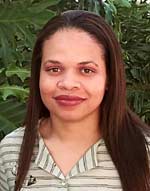
 Dr. Ashanti Pyrtle is an assistant professor in the College of Marine Science at the University of South Florida. She's a chemical oceanographer who studies the fate, transport and retention of radionuclides in aquatic ecosystems. Her PhD work investigated the marine distribution of radioisotopes from the Chernobyl accident, and she's currently doing work in Puerto Rico, off the Florida coast, and in the Savannah River. She's one of the first female African-American chemical oceanographers, and the first African-American to earn an oceanography Ph.D. from Texas A&M University.
Dr. Ashanti Pyrtle is an assistant professor in the College of Marine Science at the University of South Florida. She's a chemical oceanographer who studies the fate, transport and retention of radionuclides in aquatic ecosystems. Her PhD work investigated the marine distribution of radioisotopes from the Chernobyl accident, and she's currently doing work in Puerto Rico, off the Florida coast, and in the Savannah River. She's one of the first female African-American chemical oceanographers, and the first African-American to earn an oceanography Ph.D. from Texas A&M University.
Dr. Pyrtle's career trajectory has not been completely free of challenges, and on the Women Exploring Oceans website, she writes:
For me, as a woman as well as a minority, the challenge has always been feeling like I am representing the entire African American female population. Going into graduate school, there are these expectations that are placed on you, by yourself to some extent, but also by others that you must succeed, because otherwise you are letting this huge population of people down. That can be really stressful. Going into an environment like oceanography where there have traditionally not been as many women, you are faced with that. But as a minority, there is even more of a challenge. ... For me, if somebody said we don't expect you to make it, I was going to show them that I could. And that is one of the things that I did. ... I know that if I am able to succeed in those arenas, I'll make it a little easier for the next person coming behind me. That is one of the things I am committed to doing.
And that commitment is one that Dr. Pyrtle makes a very important part of her life. She is the force behind the Minorities Striving and Pursuing Higher Degrees of Success in Earth System Science Initiative (MS PHD'S), an NSF and NASA funded initiative aimed at facilitating the increased participation of minorities in Earth Systems Science. The initiative takes ~30 minority undergraduate and graduate students, pairs them with mentors, builds community, facilitates networking, and exposes them to both broad and discipline-specific Earth system science over the course of the year. The project kicks off at the American Geophysical Union annual meeting in December, includes at least one other discipline-specific meeting, and concludes with a professional development workshop and visits to the National Academy of Sciences. In addition to visiting NAS, the students also visit NSF, NASA, EPA, NOAA, FWS, US Capitol and Congress, USGS as part of their Capstone Activities, Smithsonian's National Museums of Natural History, African Art and the American Indian. The program's alumni continue to network via email, forums, facebook, and in real life.
In her interview at "Women Exploring Oceans", she talks about how she became interested in the oceans by watching Jacques Cousteau, but how that interest was strengthened when she met a marine biology graduate student who took them time to spend a day talking about oceans with Ashanti, then a fifth grader. Maybe that early mentoring by a caring graduate student was also the impetus for Dr. Pyrtle's commitment to mentoring and outreach to K-12, undergraduate and graduate students and teachers. For in addition to advising a lab of eager graduate students and undergraduate interns and running the MS PHD'S program, Dr. Pyrtle also directs the Florida-Georgia LSAMP USF Bridge to the Doctorate Fellowship and Alfred P. Sloan Foundation Minority PhD Program for the USF College of Marine Science, and co-directs two environmental science education programs for in-service teachers in the Tampa Bay, FL and Houston, TX areas. In addition she also co-directed the USF College of Marine Science OCEANS GK-12 Fellowship Program. She's also involved with a number of other professional development, diversity, and education initiatives and committees at the college and national level. She's also the mother of a 3-year old, and is active in her community. (SW notes: I'm a little in awe of all she does.)
One last piece of advice from Dr. Pyrtle?
And that's the last thing. You really can't do it on your own. You really do need a network and a support system because things do get hard sometimes. When they do, you need people who will help and/or encourage you.
For more information on Dr. Ashanti Pyrtle:
- Her faculty web page at USF
- Profile at WomenOceanographers.org
- Career Profile at the On the Cutting Edge website
- More information on the MS PHD's program.
This post is a contribution to the Diversity in Science Carnival being launched by DNLee. Special thanks to Dr. Pyrtle for agreeing to let me profile her.
Coolio!
Awe? A little? Professor Pyrtle brings it! What a set of accomplishments.
Thanks for introducing us to this fantastic scientist and educator.
WOW!!!